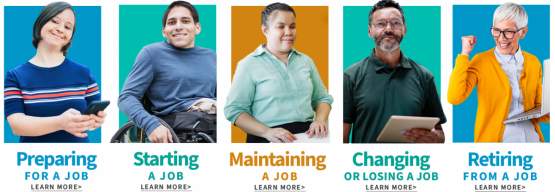Check out the Latest 2021 LEAD On! Newsletter
Quarterly
In This Issue
- Secure Your Financial Future: A Toolkit for Individuals with Disabilities
- Edward Mitchell’s Journey to Financial Security
- On Cue
- On The Horizon
Secure Your Financial Future: A Toolkit for Individuals with Disabilities

Due to COVID-19, many Americans find themselves out of work, with reduced hours, and/or working remotely. As a result, large numbers of people—including those with disabilities—must make employment-related decisions based on new financial situations.
In response, the Office of Disability Employment Policy (ODEP), Employee Benefits Security Administration (EBSA), and the Employment and Training Administration (ETA) collaborated to develop a Financial Toolkit for people with disabilities and others(link is external) experiencing new levels of financial stress and unemployment as a direct result of the pandemic. The comprehensive Toolkit provides critical financial engagement/literacy considerations and is designed to be used by anyone, regardless of where they are in the work life cycle.

The Toolkit is organized around the five phases of the work life cycle: (1) preparing for a job, (2) starting a job, (3) maintaining a job, (4) changing or losing a job, and (5) retiring from a job. The five sections of the Toolkit offer users tools and resources to help them think about and address financial questions related to each of the five stages of this cycle.
Preparing for a Job. Resources in this section are for people of all ages looking for a first job and those who, because of the COVID-19 pandemic, are looking for a new job. To prepare for a job, it is useful for an individual to consider their budget, what level of earnings they need, and the impact that work will have on any public benefits they receive. The resources in this section can help individuals get job-ready by providing answers to important questions such as: “How can I prepare financially for a job?”; “Can I work if I receive Supplemental Security Income (SSI) or Social Security Disability Insurance (SSDI)?”; and “How do I connect with people who can help me find a job?”
Starting a Job. When someone gets a job, they have decisions to make about their new pay and benefits, when to disclose a disability, and how to start saving for retirement. This section gives access to resources that can be helpful at this stage and answers questions such as: “Where can I get information on setting financial goals?”; “How can I save money that I earn from my new job?”; and “I think I could benefit from accommodations. How should I disclose my disability?”
Maintaining a Job. The longer someone works for an organization, the more likely they are to have the chance to receive a raise or pursue a promotion. An individual may also experience new needs for accommodations due to a newly acquired disability or because the nature of the work has changed as a result of COVID-19 restrictions or other reasons. This section of the Toolkit provides resources on maintaining a job, including requesting accommodations, and answers questions such as: “Will a raise or a promotion impact my SSI, SSDI, or Medicaid benefits?”; “How can I maintain my job by working from home?”; and “Can I use my ABLE account for things I buy to go to work?”
Changing or Losing a Job. Due to the COVID-19 pandemic, many people lost a job or work more than one part-time job. This section provides guidance to these individuals as they seek new or different employment by answering questions such as: “Should I tell the Social Security Administration if I lose my job/income?”; “I lost my job. What do I do about healthcare coverage?”; and “I want to change jobs. How can I brush up on job skills and learn more about other industries to change jobs?”
Retiring from a Job. Retirement can be an exciting time of life, and planning for it can come with a lot of questions. Understanding employer-sponsored retirement benefits, healthcare benefits, and other retirement savings all play a role in managing a personal budget for a secure retirement. This section includes answers to important questions such as: “Where can I learn more about my pension, 401(k), and/or Individual Retirement Account (IRA)?”; “What are 401(k) plan fees, and who pays for them?”; and “I am close to retirement, but I am concerned that I have not saved enough. What can I do?”
Frequently Asked Questions
Each section includes a list of frequently asked questions (FAQs) associated with resources that are part of that work life cycle phase. Some of the questions include more than one answer and/or point to more than one resource.
The financial decisions an individual needs to make along the life cycle of employment during and after the COVID-19 pandemic—planning for a job, getting, keeping, and advancing in that job, recovering from the loss of a job, and retiring—are substantial. Since March 2020, workforce practices have shifted drastically (e.g., there is more virtual interviewing, virtual conferencing, and remote teleworking) while ideas about the future of work have evolved. Until now, no single set of materials or website existed that explored these needs and provided guidance for people with disabilities as they strive to obtain or maintain employment and financial stability before, during, and after a crisis. The Financial Toolkit provides a path forward based on where each individual is in their employment journey, with curated tools and resources to help them meet their personal financial goals.
Edward Mitchell’s Journey to Financial Security
 Edward Mitchell knows from his own experiences that obtaining information about financial resources for people with disabilities isn’t easy. After a hit and run car accident that left him with a spinal cord injury when he was 17 years old, he has had considerable educational and community success, but continues to educate himself and others about resources that can be used to increase financial security.
Edward Mitchell knows from his own experiences that obtaining information about financial resources for people with disabilities isn’t easy. After a hit and run car accident that left him with a spinal cord injury when he was 17 years old, he has had considerable educational and community success, but continues to educate himself and others about resources that can be used to increase financial security.
Edward graduated magna cum laude with a bachelor’s degree from Lane College, a private historically Black college, and went on to get his master’s in business administration (MBA) from Union University. He works part-time as an Independent Living Specialist with the Jackson Independent Living Center and also serves as the Fan Relations Coordinator for the Jackson Generals minor league baseball team. He is an active member of Alpha Phi Alpha Fraternity, Inc. and a member of the National Black MBA Association. On March 29th of this year, Tennessee Governor Bill Lee appointed Edward to a three-year term as a member of the Council on Developmental Disabilities.
Despite his significant achievements and work skills, he has been forced to take part-time employment at reduced salaries in order to maintain benefits and needed nursing support. However, Edward is focused on moving into full-time employment. Towards that end, he works with a benefits advisor to learn more about work incentives and supports through the Social Security Administration’s Ticket to Work program.
Also, Edward’s Achieving a Better Life Experience (ABLE) account allows him to save money without penalizing him or jeopardizing his benefits. He likes that it gives him control over his finances and increases his independence. Edward wants to join his more financially independent, non-disabled friends by moving out of his parents’ house and buying his own home. He recently fulfilled one of his ABLE goals by purchasing an accessible van which gives him much needed autonomy.
Because Edward knows how important it is to share financial resources with the disability community, he serves as an ABLE National Resource Center(link is external) Black, Indigenous and People of Color (BIPOC) Ambassador. In this role, he educates people with disabilities about their financial savings options. He works to increase the number of people in the BIPOC community who hold tax-advantaged ABLE savings accounts that help them fund disability-related expenses.
On Cue
Value-based purchasing, with its focus on paying for outcomes and quality, rather than solely reimbursing for services delivered, is increasingly recognized as an important tool in advancing Employment First, promoting competitive integrated employment outcomes, and supporting employment service providers to be successful in their efforts.
This three-part webinar series coincides with the release of a comprehensive guide titled: Value-Based Payment Methodologies to Advance Competitive Integrated Employment: A Mix of Inspiring Examples from Across the Country. The guide, authored by Medicaid Expert Dr. Lisa Mills, includes a thoughtful overview of rate restructuring, best practices, numerous case examples from a range of states and state systems, lessons learned based on experiences, and future opportunities.
Part I: Value, Outcome and Performance-Based Payment Methodologies to Advance Competitive Integrated Employment in State Medicaid Long-Term Services and Supports (LTSS) Systems and Managed Care LTSS Systems
Part II: Supporting Employment Service Providers to Succeed and Prosper by Partnering to Advance Competitive Integrated Employment: Applying Value, Outcome and Performance-Based Payment Methodologies
Part III: Value, Outcome and Performance-Based Payment Methodologies to Advance Competitive Integrated Employment in State Vocational Rehabilitation and Behavioral Health Systems
On The Horizon
July Webinars:
- Thursday, July 15th at 3:00 p.m. ET – A Second Chance at Inclusion: People with Disabilities, Work, and Re-entry After Incarceration
- Registration(link is external)
- People with disabilities are dramatically overrepresented in our nation’s prisons and jails. According to the Bureau of Justice, almost 40% of people behind bars reported having at least one disability. This is approximately 2.5 times higher than the general adult population. With 650,000 people released from prison and nine million people released from jail each year, millions of people with disabilities re-enter communities seeking employment, housing, and a second chance. In this webinar, attendees will learn about effective practices, partnerships, and policies that support transition to employment for individuals with disabilities formerly involved in the justice system. Mark the 31st anniversary of the Americans with Disabilities Act (ADA) as we engage with subject matter experts, practitioners, and advocates from the field: Ivette Gutierrez with Social Policy Research Associates, Sharif Brown from Alliance of Disability Advocates NC, and Michael Mendoza with the Anti-Recidivism Coalition.
- Save the Date: July 27th at 3:00 p.m. ET – Financial Well-Being for Individuals with Disabilities During the Pandemic and Beyond
Upcoming 2021 Webinars:
- Partnerships Between Workforce Boards and Financial Institutions
- Promoting Equity Through Cross-system Collaboration
- Enhancing WIOA Disability-related Reporting
